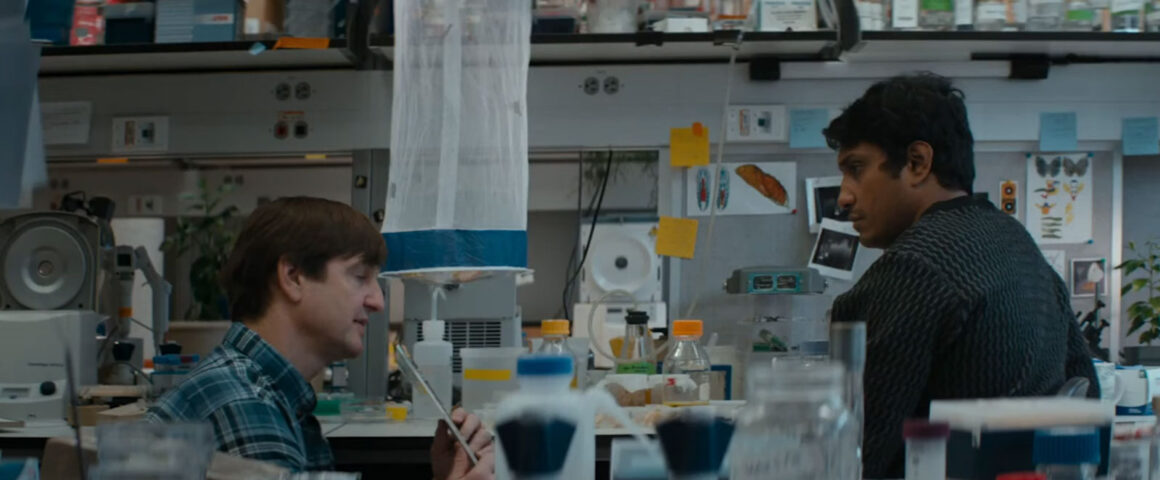Son of Monarchs, a feature film written and directed by Alexis Gambis, a microbiologist and film director/screenwriter, is not the type of work likely to be appreciated — or perhaps even tolerated — by moviegoers that prefer tightly constructed, thematically succinct cinema. It is multi-layered in its storyline with a mélange of styles that range from the quasi-documentary to magical realism. Still, this story of a New York-based microbiologist conducting genetic research on the monarch butterfly, and who travels back to his place of origin in Michoacán, Mexico, is thought-provoking and well worth viewing. Mendel (played by the award-winning actor Tenoch Huerta, “Güeros”) is a believable portrait of a complex man who finds himself on a journey of self-discovery to seek meaning in his scientific research. At the same time, he seeks ways to balance his professional endeavors with his cultural, social, and familial roots.
Called back to Mexico because of the death of a grandmother, Mendel (a reference to the historical Mendel), the biologist travels from Manhattan to Mexico, from the laboratory to the Sierra Madre, and from university seminars and Manhattan bodegas to inter-generational family conflicts and local rituals. If these thematic layers aren’t enough for the viewer to juggle, Gambis has embedded Mendel’s journey in search of meaning with flashbacks of a childhood filled with wonder and tragedy. As a boy, Mendel demonstrates a wide-eyed fascination with the natural world and with the nature of the world. These qualities plant seeds of discord in his relationship with his older brother, Simon (Noé Hernández, “Bel Canto”), who is portrayed as pragmatic and deliberate: Someone rooted in the belief that everyday life is simply overcoming one obstacle after another. The film convincingly depicts this interpersonal conflict in Biblical terms: A parable about two brothers that take separate paths in life. There is the brother that stays behind to maintain the family and the other that goes off to pursue worldly and perhaps otherworldly dreams. As is often the case in such parables as in real life, the former bears resentment towards the latter.
Family conflict could easily be the focus of a 97-minute feature film, however, Gambis has ambitiously attempted to include corresponding and equally significant internal conflict. Some viewers may find the movie too replete with subplots, too filled with ideas, and the protagonist too overburdened with doubts and contradictions. At times, I had the feeling the narrative was more appropriate and could have been better handled in a novel than in a film to be viewed at one sitting. Additionally, the blending of cinematic styles — while interesting — might be better managed in a modernist novel, where a reader has more time to stop and consider the effect of extreme formal juxtapositions.
What are some of Mendel’s interior battles? For one, Mendel tries to balance his cultural heritage — rooted in centuries of tradition with a modernist, twenty-first century scientific one. Traditional society focuses primarily on stability, continuity, and community. Mendel’s scientific inquiries reflect the modern impulse to explore, evolve, and improve. Mendel conducts genetic experiments with butterflies to expand scientific and technological horizons, and perhaps to “advance” the human condition. But at the same time, the character has fears that he may lose touch with being part of the natural world because he spends a good deal of time dissecting and analyzing it. As Vicente (Gabino Rodríguez, “All the Light That We Can See”), Mendel’s best buddy in Mexico, tells him, “Your president calls us animals. Of course, we’re animals. That is a part of being human!” Vicente reveals the significance of this truism when he leads a memorial service for Mendel’s grandmother that includes indigenous ritual and prayer.
Back in the United States, Mendel’s somber attitude is tempered by Sarah (Alexia Rasmussen, “Our Idiot Brother”), his love interest, a woman that works for an activist ecological organization, and, coincidentally, pursues trapeze work as a pastime. Asking Sarah what would be the consequences if humans could fly, Sarah tells Mendel that people would end up peeing on one another. This amuses the microbiologist, but it’s brief comic relief. He is never far from experiencing his spiritual isolation, and Gambis provides visual metaphors of Mendel’s existential crisis with surreal close-ups of the introspective scientist surrounded by butterflies or embedded in abstract designs whose colors resemble those of the monarchs he studies.
Mendel is a complex character who eschews stereotyping. He is as comfortable in a microbiology lab and arguing over the possibilities of gene splicing as he is in getting down to earth — affectionately calling his friends “guey” (dude) and “cabron” (asshole). If you appreciate films that neither have neat endings nor are structured with a mélange of cinematic styles, you could find a lot to like in Son of Monarchs. If you appreciate a filmmaker that holds back on definitive denouement and doesn’t feel the need to telegraph the motivation of fictional characters, I recommend you see it. Harold Pinter, the British playwright and screenwriter, was once asked, “What do you imagine your characters were doing before their appearance onscreen?” To which he answered, “How the hell do I know?”



